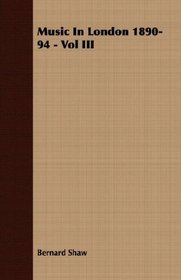Search -
Music In London 1890-94 - Vol III
Music In London 1890-94 - Vol III
Author:
MUSIC IN LONDON 1890-94 fre0Me y BY BERNARD SHAW IN THREE VOLUMES VOLUME HI LONDON CONSTABLE AND COMPANY LIMITED Revised znd reprinted jbr this Standard JSditzon rights fully protected ctnd reserved IN GREAT BY R. It. CL. ARIC, f USIC IN LONDON 1890-94 7 June 1893 I HAVE to congratulate the Philharmonic Society on having at last made a resolute ... more »
Author:
MUSIC IN LONDON 1890-94 fre0Me y BY BERNARD SHAW IN THREE VOLUMES VOLUME HI LONDON CONSTABLE AND COMPANY LIMITED Revised znd reprinted jbr this Standard JSditzon rights fully protected ctnd reserved IN GREAT BY R. It. CL. ARIC, f USIC IN LONDON 1890-94 7 June 1893 I HAVE to congratulate the Philharmonic Society on having at last made a resolute ... more »
ISBN-13: 9781406739305
ISBN-10: 1406739308
Publication Date: 3/15/2007
Pages: 328
Rating: ?
ISBN-10: 1406739308
Publication Date: 3/15/2007
Pages: 328
Rating: ?
0 stars, based on 0 rating
Publisher: Vintage Cookery Books
Book Type: Paperback
Members Wishing: 0
Reviews: Amazon | Write a Review
Book Type: Paperback
Members Wishing: 0
Reviews: Amazon | Write a Review




